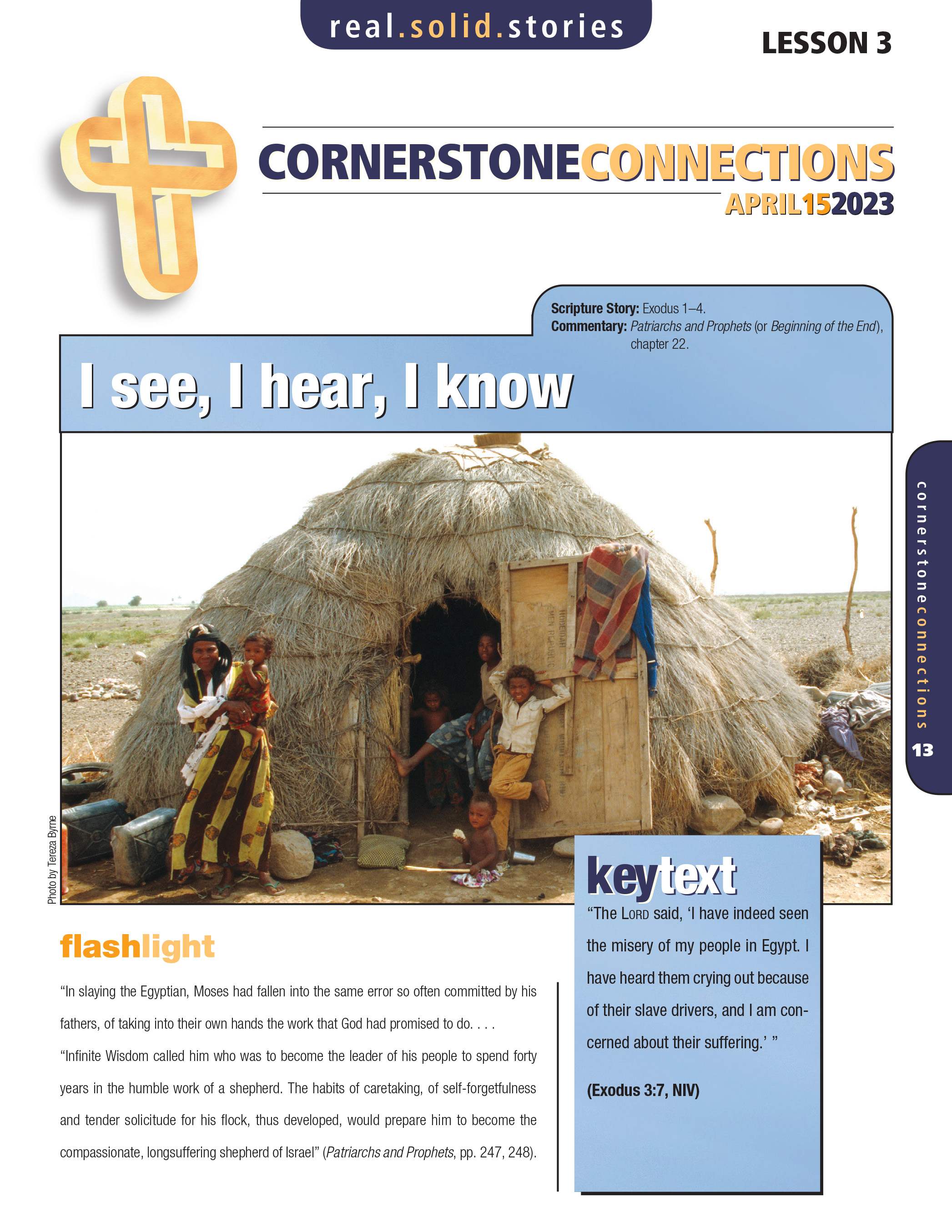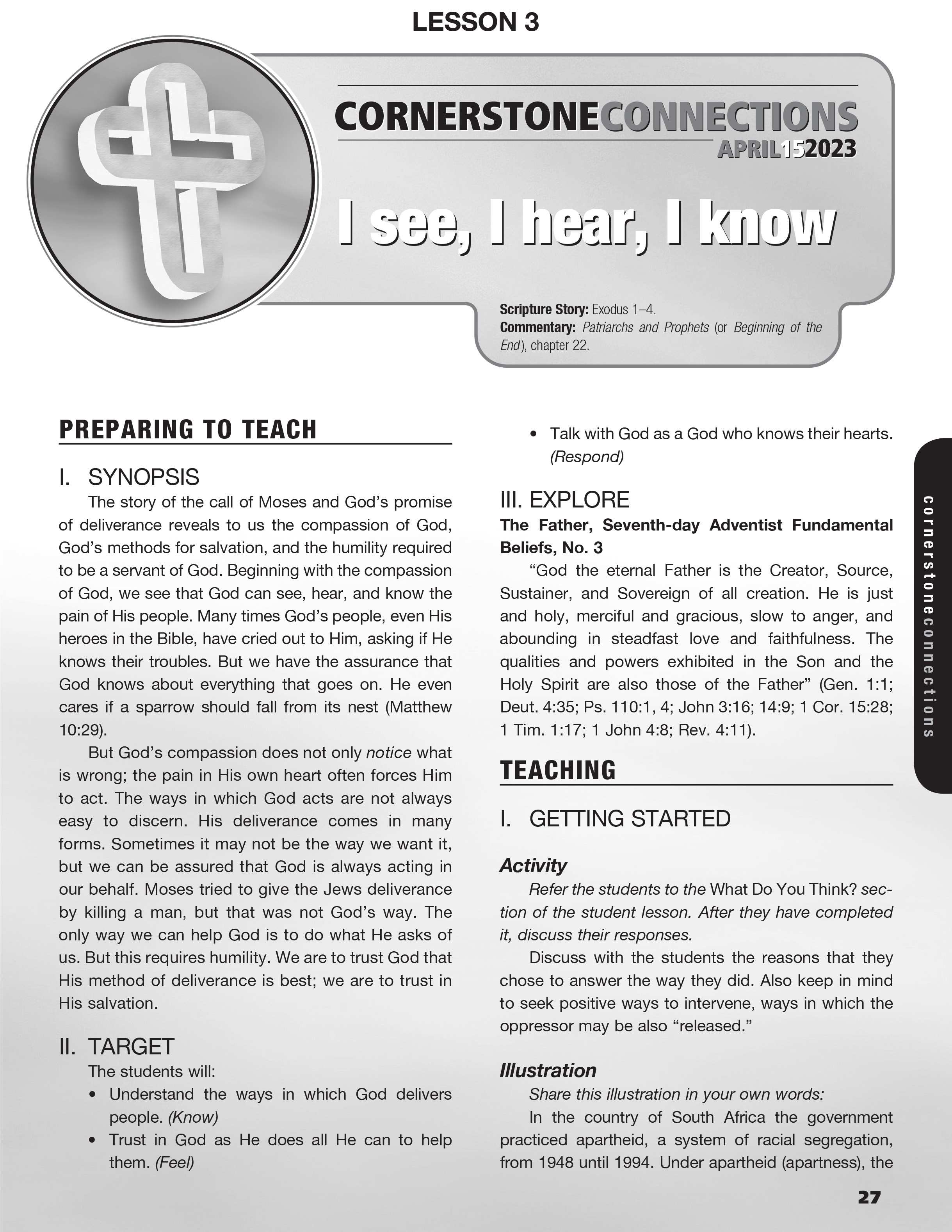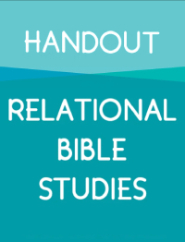"I See, I Hear, I Know"
Click below to download the Cornerstone Connections leader’s guide and student lesson. This week’s resources also include two lesson plans and a discussion starter video which offer different ways of looking at the topic. Each lesson plan includes opening activities, scripture passages, discussion questions, and real-life applications.
God’s call to Moses reveals to us the compassion of God, His methods of salvation, and the humility required to be a servant of His.
SCRIPTURE PASSAGES
OVERVIEW
One of the most recognized stories in scripture is story of Moses’ origin. For this lesson we plan to go deeper on Moses’ path from poverty to privilege to purpose. It is a story arc that many of us will experience in our lives economically, socially, and spiritually. Even though it isn’t the end of Moses’ story, how he found his purpose and calling is something we can all learn from.

OPENING ACTIVITY: WHO DID IT?
(Leader: This game is similar to the 2019 hit mobile game “Among Us,” or perhaps your group has played the game “Mafia” before. If those games are familiar to your group then this game will be as well. Finally, this game will work best with a medium to large group of students. If you have only two or three students, you will need to get creative.)
Make slips of paper and number them with the number of people in your group. Give each student a number, randomly, and then call out a number. That number will be the person who is “It.” The point of this game is for the group to figure out who is eliminating people. The role of the person who is “It” is to get rid of everyone from the group without getting caught.
Have all of the students stand up and start walking around. There is only one thing they can say while walking around. They should go and shake hands with another player and say “Howdy, Howdy!” Most handshakes will be normal, but the “It” person will eliminate people by tapping the inside of the palm while shaking someone’s hand. If a student’s palm gets tapped they should silently count to three and then sit down. They are out and cannot speak any more.
If a player thinks they know who the “It” is, they can yell “I know who is it!” and the game immediately pauses. They then can make an accusation about who they think is “It.” The person who is “It,” along with everyone still in the game, can join the debate, and the person accused can defend themselves and try to convince the other players that they are innocent. Eliminated players do not have a voice in this process. Have all non-eliminated players vote on the accusation. If they are right, the game is over. If they are wrong, the person they wrongly accused is eliminated and the game continues.
DISCUSSION
FINAL QUESTIONS
TRANSITION
This is a silly game. But sometimes the stakes are higher. Sometimes leaders (“It” people) make really bad and harmful decisions.
Today in our study we are looking at a Bible story almost everyone has heard about. Holly wood has made several blockbuster movies about Moses. Some of you might remember watching the Prince of Egypt as a kid. Moses is important because he becomes the patriarch that really is the person who brings the Jewish religion into existence. So, his origins and how he became a great leader are something that are important to us! Much like we study Abraham Lincoln, Gandhi, or Martin Luther King, Jr. and how they discovered their “Why?” we study Moses. Today we are going to look at how Moses found his “Why?”!
BIBLE STUDY GUIDE
Today in our lesson we are going to go through three P’s in the life of Moses that perhaps many high school students can relate to in their lives as well. Poverty, Privilege, and Purpose. Let’s start out with poverty.
Read Exodus 1:22 through 2:5.
22 Then Pharaoh gave this order to all his people: “Every Hebrew boy that is born you must throw into the Nile, but let every girl live.”
The Birth of Moses
2 Now a man of the tribe of Levi married a Levite woman, 2 and she became pregnant and gave birth to a son. When she saw that he was a fine child, she hid him for three months. 3 But when she could hide him no longer, she got a papyrus basket for him and coated it with tar and pitch. Then she placed the child in it and put it among the reeds along the bank of the Nile. 4 His sister stood at a distance to see what would happen to him.
5 Then Pharaoh’s daughter went down to the Nile to bathe, and her attendants were walking along the riverbank. She saw the basket among the reeds and sent her female slave to get it.
DISCUSSION
I want us to shift back to today. Many of us have had things stacked against us in life. Perhaps we don’t come from the perfect family background. Maybe we have experienced prejudice. And sometimes it feels as if there is no way forward.
Moses was one of the lucky kids, actually. Not everyone got plucked from the river by a princess. Moses went from poverty to privilege and it wasn’t anything that he did. He was at the right place at the right time (what we often call God’s providential working).
Read Exodus 2:9-10.
9 Pharaoh’s daughter said to her, “Take this baby and nurse him for me, and I will pay you.” So the woman took the baby and nursed him. 10 When the child grew older, she took him to Pharaoh’s daughter and he became her son. She named him Moses, saying, “I drew him out of the water.”
We don’t get a lot of detail about Moses’ teen years, but it seems that he spent them in the palace of Pharaoh. We can guess that he went to the same schools as the other upper class Egyptian children. He was trained in the way of the court. Remember this was one of the greatest empires of its time, and Moses had everything going for him. His life was 180 degrees different from the other Hebrews.
DISCUSSION
Moses, it seems, did have some sympathy for his family of origin because he lost his place in the palace to protect a Hebrew slave and even ended up committing murder to protect them. This sends Moses on the run and back to a humble life where he once again becomes a nobody, at least as far as making an impact on a large group of people.
That changed when God decided that it was time for Moses to become a leader.
One of the great scriptures that shows God’s willingness to be involved with humanity is Exodus 2:23-25.
23 During that long period, the king of Egypt died. The Israelites groaned in their slavery and cried out, and their cry for help because of their slavery went up to God. 24 God heard their groaning and he remembered his covenant with Abraham, with Isaac and with Jacob. 25 So God looked on the Israelites and was concerned about them.
God hears and acts. And his action came through helping Moses find his “Why?” or his “Purpose.” God appears to Moses at the burning bush; most of you are familiar with this part of the story. But sometimes we forget to actually read the story because we are so caught up, as Moses was, with the craziness of a bush that doesn’t burn. Let’s read what God says to Moses.
Read Exodus 3:7-10
7 The Lord said, “I have indeed seen the misery of my people in Egypt. I have heard them crying out because of their slave drivers, and I am concerned about their suffering. 8 So I have come down to rescue them from the hand of the Egyptians and to bring them up out of that land into a good and spacious land, a land flowing with milk and honey—the home of the Canaanites, Hittites, Amorites, Perizzites, Hivites and Jebusites. 9 And now the cry of the Israelites has reached me, and I have seen the way the Egyptians are oppressing them. 10 So now, go. I am sending you to Pharaoh to bring my people the Israelites out of Egypt.”
DISCUSSION
Moses was called to be the leader of Israel, but we will see throughout the rest of the Bible that people get called to do all sorts of things, such as to be builders, soldiers, prophets, craftspersons, business people, etc. God can use you and your talents to build the kingdom of God in ways that might not always include being a pastor at a church. Every one of you has a God-given purpose.
BIG QUESTION

APPLICATION
Did you know that one of the ways that you can discover your calling is to identify your spiritual gifts? The Youth Ministries Department of the Seventh-day Adventist church has created a spiritual gifts test just for students! Why not take some time during Sabbath School to take the assessment? Once you’ve shared the results with your leader, you all can find ways to start experimenting with your gifts! This is a great first step towards finding your purpose!
Spiritual Gifts Questionnaire - Adventist Youth Ministries (gcyouthministries.org)

LEADER’S NOTE
For a Relational Bible Study (RBS) you’ll want to get into the Scripture passage and encourage the youth to imagine participating in the story while it’s happening. Then you will be able to better apply it to your own situation today.
You will need to ask God for the Holy Spirit to be present as your small group discusses the questions (no more than 3-6 people in a group is recommended). Start with the opening question. It is a personal question and the answer is unique for each individual. There is no right answer and nobody is an expert here, so don’t be surprised when you hear different responses. You are depending on the Holy Spirit to be present and to speak through your group. Say what God prompts you to say, and listen to what others share.
Take turns reading the chapter out loud. Follow that with giving the students some time to individually mark their responses to the questions (a PDF version of the handout is available as a download). This gives each person a starting point for responding when you start to share as a group. Next, begin the discussion by asking the students to share what they marked and why on each question as you work your way through. Feel free to take more time on some questions than others as discussion warrants.
Encourage each person in the group to apply what is discussed to their personal lives and to share with the group what they believe God wants them to do. Then ask them to pray that God will help each of them to follow through in doing so. Remind them to expect that God will show them ways to live out the message of this passage in the coming week, and that they are free to ask others in the group to help hold them accountable.
OVERVIEW
The story of Moses is widely known, widely acknowledged, and often spoken about. However, there are so many layers and perspectives to this story, considering it spans almost four chapters of the Bible! In order to fully absorb one of the messages being presented through Moses, we will focus our attention on the story of his calling.
Biblical characters receive a lot of praise, and in a way, they deserve it: they were great people who did a lot of good in the world and made a lasting impact on history! However, we must remember that they were still human; people who made mistakes and were not immune to sin. Moses is a prime example of this: while being a great leader revered throughout the Bible, he had his weaknesses and made his fair share of mistakes. This is why studying his calling is so important; anyone and everyone can be called into God’s mission. All you need to do is be willing.
In Exodus Chapter 2:11-15 we see our “golden child” succumb to sin, and it is a pretty serious one: murder! The natural consequence of this is that he must run away from the Pharaoh who is looking to kill him (note that even here, after committing this sin, God has preserved Moses’ life for His purpose). Arriving in Midian and having ample time for reflection, Moses repents from his sins and continues to live as a Godly man. Now, in front of a burning bush, it is time for this purpose to be executed. God is calling Moses to do a job of the utmost importance: deliver his people from the cruel hand of the Pharaoh. Moses protests; he says he is “not eloquent,” and expresses fear that no one will believe him (4:10). But God does not accept such excuses, stating “I will help you speak and will teach you what to say (4:12).”
Through all of this, God is working with Moses to help him fulfill his purpose. Even in his reluctance, God does not force Moses to follow his directions, but rather provides him with the tools to aid in his ministry. Everyone can be an asset for God, as long as they are willing to work with Him!
A Burning Call
Have you ever felt that God was calling you to do something for Him?
Read Exodus 2:11-15.
11 One day, after Moses had grown up, he went out to where his own people were and watched them at their hard labor. He saw an Egyptian beating a Hebrew, one of his own people.
12 Looking this way and that and seeing no one, he killed the Egyptian and hid him in the sand.
13 The next day he went out and saw two Hebrews fighting. He asked the one in the wrong, “Why are you hitting your fellow Hebrew?”
14 The man said, “Who made you ruler and judge over us? Are you thinking of killing me as you killed the Egyptian?” Then Moses was afraid and thought, “What I did must have become known.”
15 When Pharaoh heard of this, he tried to kill Moses, but Moses fled from Pharaoh and went to live in Midian, where he sat down by a well.
Read Exodus 4:1-17.
Moses answered, “What if they do not believe me or listen to me and say, ‘The Lord did not appear to you’?”
2 Then the Lord said to him, “What is that in your hand?”
“A staff,” he replied.
3 The Lord said, “Throw it on the ground.”
Moses threw it on the ground and it became a snake, and he ran from it. 4 Then the Lord said to him, “Reach out your hand and take it by the tail.” So Moses reached out and took hold of the snake and it turned back into a staff in his hand. 5 “This,” said the Lord, “is so that they may believe that the Lord, the God of their fathers—the God of Abraham, the God of Isaac and the God of Jacob—has appeared to you.”
6 Then the Lord said, “Put your hand inside your cloak.” So Moses put his hand into his cloak, and when he took it out, the skin was leprous—it had become as white as snow.
7 “Now put it back into your cloak,” he said. So Moses put his hand back into his cloak, and when he took it out, it was restored, like the rest of his flesh.
8 Then the Lord said, “If they do not believe you or pay attention to the first sign, they may believe the second. 9 But if they do not believe these two signs or listen to you, take some water from the Nile and pour it on the dry ground. The water you take from the river will become blood on the ground.”
10 Moses said to the Lord, “Pardon your servant, Lord. I have never been eloquent, neither in the past nor since you have spoken to your servant. I am slow of speech and tongue.”
11 The Lord said to him, “Who gave human beings their mouths? Who makes them deaf or mute? Who gives them sight or makes them blind? Is it not I, the Lord? 12 Now go; I will help you speak and will teach you what to say.”
13 But Moses said, “Pardon your servant, Lord. Please send someone else.”
14 Then the Lord’s anger burned against Moses and he said, “What about your brother, Aaron the Levite? I know he can speak well. He is already on his way to meet you, and he will be glad to see you. 15 You shall speak to him and put words in his mouth; I will help both of you speak and will teach you what to do. 16 He will speak to the people for you, and it will be as if he were your mouth and as if you were God to him. 17 But take this staff in your hand so you can perform the signs with it.”
SUMMARY
The calling of Moses provides important lessons to us, especially as youth leaders/mentors for Christ. It can be a daunting task—having a bunch of young people looking up to you and maybe even making you “bigger than you are.” It is important to remember we are all human; we are all prone to making mistakes—getting angry or feeling incapable, and wanting to run away from the calling God has given us. But there is great hope in this story: we are allowed to feel this way, and still be God’s chosen workers. Cut yourself some slack and allow God to work with you and even make accommodations! God is here to work with any of His children who are willing to let Him use them, so allow yourself to communicate with God and have faith in the purpose He has for you in your ministry!

APPLICATIONS
The story of Moses’ calling is so important for those of us looking at our purpose and perhaps feeling some apprehension and fear. It is always a necessary part of studying to sit back and meditate on how a story or lesson applies to us today as youth or even youth leaders. Below you will find three applications that can benefit the youth in your group and help them meditate on the Word shared today. These applications work both individually and in a group.
Our teenage years are often considered some of the most emotionally and psychologically difficult ones of our life, and rightly so! As a teenager, one of the biggest things on your mind might be “What is my calling? What is my purpose?” This question could present itself in lots of different ways—maybe choosing a career path or questioning your role in your faith. It is normal to be confused about your future! Luckily, we have the most powerful Helper on our side: God. He knows your purpose and your calling, and He has placed you on this earth for something marvelous.
Have you heard of the “imposter syndrome”? According to the American Psychological Association, this is a very real thing characterized as “feeling like a fraud” in an area in which one is considered to be an expert (like the field you are studying or the subject you are good at). Imposter syndrome can sometimes happen in our walk with Christ: it happened to Moses!
Across the Bible, there are various names that we exalt to a certain level of heroism. Of course, these Bible heroes have all left an important impact that lasts all the way through today! However, it is important to remember that they were still very much human, and therefore, made mistakes and sometimes fell into sin.





